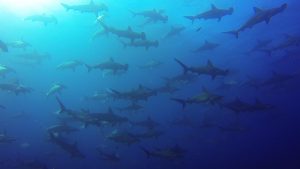Marine Protected Reserves Do More Than Restore Fish
By UMass Amherst
4/1/2019
UMass Amherst, Smithsonian, Florida research reports wider ecological benefits
 In a new analysis of the effectiveness of marine protected areas worldwide, University of Massachusetts Amherst marine ecologist Brian Cheng and colleagues report that reserves not only replenish target fish populations, they also restore ecological functioning. However, not all reserves performed equally well.
In a new analysis of the effectiveness of marine protected areas worldwide, University of Massachusetts Amherst marine ecologist Brian Cheng and colleagues report that reserves not only replenish target fish populations, they also restore ecological functioning. However, not all reserves performed equally well.
Ecological functioning is a measure of the activities that maintain life, Cheng points out. In this case, it involves rates of predation and herbivory, or when animals eat other animals or plants, he adds. Without these activities, these ocean habitats would be radically different, providing fewer benefits to society.
Analyzing field experiments from across the globe, he and collaborators at the Smithsonian Institution and the University of Florida say their findings reveal that marine reserves increase predation rates by protecting predators that were once heavily fished by humans, allowing their numbers to thrive. Their study appears online in the current issue of Ecology, the flagship journal of the Ecological Society of America.
Read more here: https://www.umass.edu/newsoffice/article/marine-protected-reserves-do-more-restore